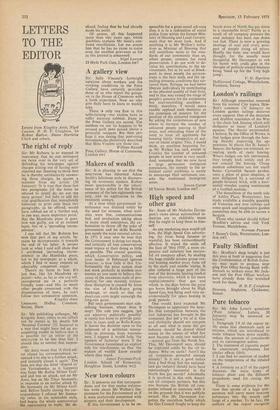Makers of wealth
Sir: It is pleasing to see that the SPECTATOR has inherited Adam Smith's felicitous style in discours- ing on economic matters. Rather more questionable is the inheri- tance of his policy for the British economy of the late eighteenth cen- tury, and its application to the twentieth century.
At a time when government in- terference was dictated solely by the need for revenue, when stati- stics were few, communications bad, and production taking place in many small enterprises, the ex- hortation to throw off the yoke of government and let skills flourish was surely the most rational advice. In 1971 it may also be true that the Government is doing too much, and certainly all true conservatives must rejoice at their doing as little as possible. The crucial question, which Conservative policy, and your leader (6 February) ignores however, is how little is this. Un- fortunately the price system does not work perfectly in modern eco- nomies as you seem to believe (be- cause of the enormous scale of pro- duction for one reason); tremen- dous disruption is created by firms the size of Rolls-Royce going bankrupt, so much so that the short-run costs might outweigh the long-run gains.
But once governments start sub- sidising business, where does it stop? The rule you suggest, 'get out wherever politically possible' is surely too loose to provide guid- ance in cases such as Rolls-Royce. It leaves the decision open to the judgment of a politician suscep- tible to pressures from business- men. I suggest it would help 'the openers of factories' more if the Government formulated an explicit rule for interference, so that 'the makers of wealth' know exactly where they stand.
James Foreman-Peck London School of Economics, Houghton Street, London wc2


































 Previous page
Previous page